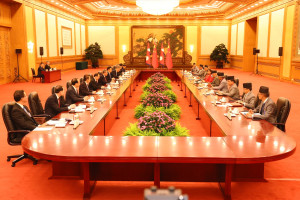National
Supreme Court to implement Karki panel’s report on judicial reform
The panel has suggested measures to curb malpractices right from picking justices.
Binod Ghimire
The Supreme Court has constituted a taskforce to implement the report prepared by a panel led by former chief justice Hari Krishna Karki that pointed out rampant corruption in the judiciary and recommended measures to check them.
A meeting of the full court on Wednesday formed a three-member committee led by chief registrar Devendra Raj Dhakal. Registrar duo Bimal Poudel and Bhadrakali Pokharel are its members.
“The full court agreed to constitute the panel to implement the report,” a justice told the Post.
Amid complaints of corruption, then-chief justice Cholendra Shumsher Rana in August, 2020 constituted the eight-member committee to study the allegations and recommend solutions. Chief Justice Prakash Man Singh Raut, then a justice, too was a member of the committee. Ever since assuming office as the chief of judiciary on October 7, Raut has pledged to implement the Karki panel’s report.
He called the full court a week after the Supreme Court returned to work following a two-week Dashain holiday. All the justices of the top court are present in the full court meeting chaired by the chief justice. The 21-strong court has 15 justices at present. The full court can make policy decisions relating to the apex court or the entire judiciary.
If the claim of Supreme Court officials is anything to go by, all the justices unanimously agreed to take the report in implementation.
“The chief justice is committed to implementing most of the recommendations in the report. The full court has paved the way for it,” Govinda Prasad Ghimire, information officer at the court, told the Post. “It has already been implemented partly. Now it needs to be implemented further.”
In December 2021, the top court started adopting a lottery system to assign cases to justices. As per the long-standing tradition, the chief justice had been assigning benches to the justices. Currently, the cause list is finalised in an automated system. The new measure was as prescribed by the Karki-led panel.
The report has proposed several measures to curb the malpractices right from the selection of the justices. Several of the recommendations need revision in the laws and even in the constitution for their implementation.
The report has outlined the sectors in need of reform, specifying eight areas including the Supreme Court, Judicial Council, Judicial Service Commission, Office of the Attorney General, law enforcement agencies (such as the police and the anti-corruption commission), the Nepal Bar Association, the Nepal Law Practitioners' Council, and the Government of Nepal, among others. The report proposed both policy and legal reforms for these sectors.
It has suggested review of the jurisdiction of all tiers of courts, including specialised courts and tribunals, to minimise the workload of the top court. Currently, it has 25,000 cases to settle. The report proposed amending the law to grant district courts the authority to hear original cases in almost all circumstances, with some exceptions. Additionally, it suggested expanding the writ jurisdiction of High Courts.
It has also raised serious questions about the structure of the Constitutional Council, though it has not given exact measures to restructure it.
“The fact that all members of the Constitutional Council, except for the chief justice, are political office holders raises concerns that political influence could affect the appointments recommended by the council. Moreover, the council’s decisions have often become controversial and subject to judicial review, leading to the question of whether the presence of judicial leadership in the council is appropriate,” reads the report.
“A detailed study should be conducted to determine whether judicial leadership is necessary on the Constitutional Council, and conclusions should be drawn based on the findings.”
It has also questioned the need for a parliamentary hearing. It has argued that such hearings could introduce political influence into the judiciary.
“The arrangement for parliamentary hearings for Supreme Court justices has raised serious concerns about the political influence on the judiciary. Therefore, it would be appropriate to conduct a separate, detailed study to conclude this matter,” it says.
The provision for parliamentary hearings, as set out in the constitution, was intended to prevent arbitrary judicial appointments and ensure that justices are approved by the people. However, the report questioned whether the hearings serve this purpose, as some individuals with questionable backgrounds have still been appointed despite the process.




 19.12°C Kathmandu
19.12°C Kathmandu













